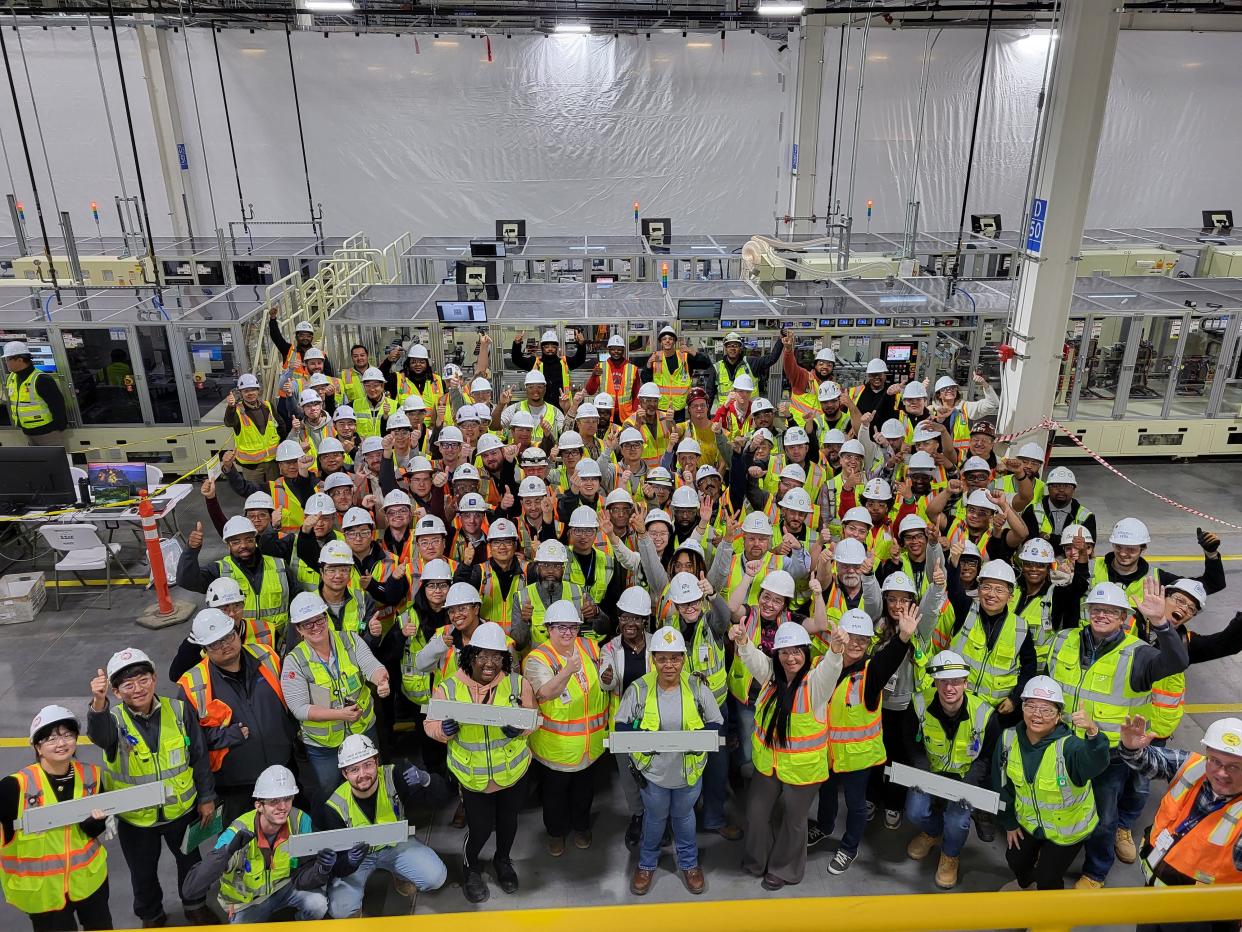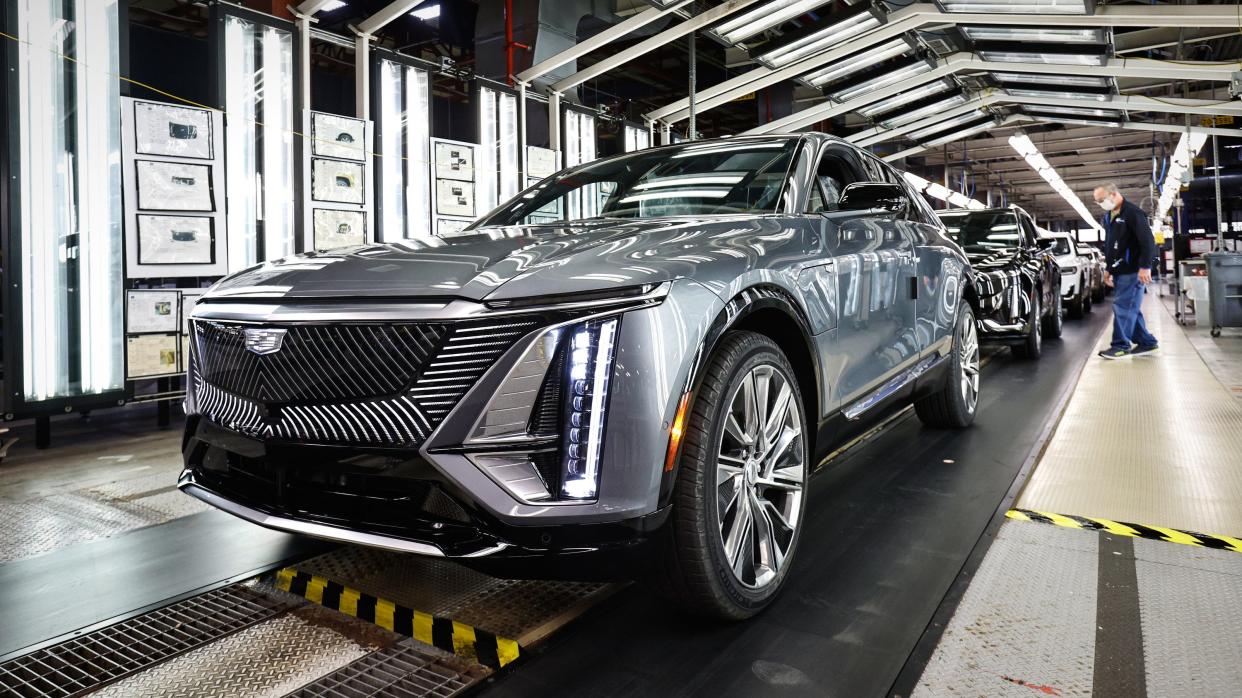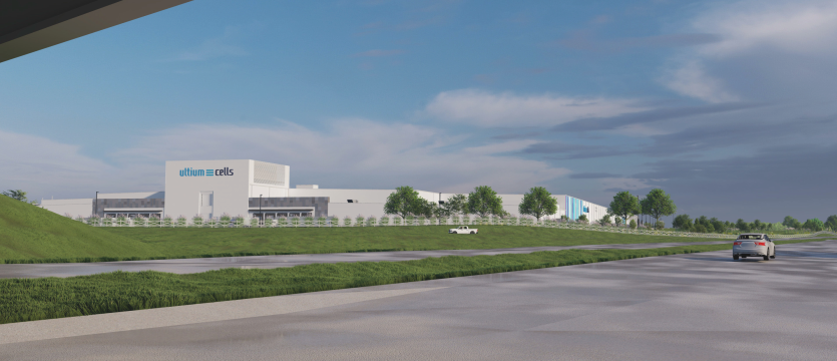GM's key to EV production and profits rest on ramp-up of new battery cell plants
General Motors is on the fast track to hitting production and profit targets for its electric vehicles this year now that it has a second battery cell plant in operation, the company said. A third battery cell plant — to be located in Lansing — is on schedule to come online later this year.
Ultium Cells LLC, which is GM's joint venture with South Korean-owned LG Energy Solution, confirmed that it has started battery cell production at its second factory, in Spring Hill, Tennessee. On March 21, Ultium said it shipped its first battery cells to its customer, GM's Spring Hill Assembly plant. GM makes the Cadillac Lyriq SUV at Spring Hill Assembly.
The Ultium Cells factory is making batteries only for GM's Spring Hill Assembly plant at the moment. Ultium in Warren, Ohio, has been making battery cells for GM since August 2022, supplying them to various GM EV plants in North America. The Ohio plant is the road map to help subsequent Ultium factories ramp up production faster, GM CFO Paul Jacobson said during the automaker's first-quarter earnings call with Wall Street.

GM leaders and analysts say bringing the new Ultium Spring Hill factory online is critical if GM is to meet its promises: to produce 200,000 to 300,000 EVs this year and make money on them by the second half.
"We ramped our first battery joint venture plant last year, and as they increased production and made other efficiencies, the cost of cells came down significantly," Jacobson said. "And cell plant No. 2, in Tennessee, is ramping even faster based on the learnings from plant one and is expected to reach full installed capacity by the end of the year.”
Jacobson said lower costs for battery raw materials such as lithium, along with the factories' production efficiencies, are helping GM improve vehicle profitability.

"We have seen more than $12,000 of year-over-year cost savings in the Lyriq alone," Jacobson said. "As we continue to ramp, we expect to see the benefits from the production tax credit continue to grow and our fixed cost absorption to improve meaningfully.”
The Inflation Reduction Act contained several provisions to accelerate EV adoption and strengthen American manufacturing and jobs. One was production tax credits to support domestic critical mineral processing and EV battery production.
Spring Hill to produce 'millions of battery cells'
Most of the vehicles built this year will probably use cells from the Ultium Cells in Ohio as the plant in Spring Hill ramps up in the second half, said Sam Abuelsamid, principal analyst for transportation and mobility at Guidehouse Insights in Detroit.
"Based on the expected ramp-up of EV production and additional models coming in 2025, if GM is able to sell all that they build, they will need the capacity of the two plants and maybe the Lansing plant at some point in 2025," Abuelsamid said in an email to the Free Press.
The Ultium Spring Hill plant spans a half mile along Highway 31 between Spring Hill and Columbia. It is expected to produce "millions of battery cells" each year for GM's new EVs, with shipments to other GM plants besides Spring Hill Assembly increasing as "the plant commissions additional production lines," Ultium Cells said in a statement.

Ultium spokeswoman Katie Burdette told the Free Press the plant will ramp up production throughout the year. She said it currently employs 1,200 hourly, salaried and support staff at the facility, but will continuing hiring.
Plans for a fourth battery cell factory
The Ultium plant in Warren, Ohio, employs 1,700 people and is located near GM's former Lordstown Assembly plant, which GM shuttered and sold in 2019. The Lansing facility will be near GM's Lansing Delta Assembly plant, where the GMC Acadia, Buick Enclave and Chevrolet Traverse are produced.
As the Free Press has reported, GM will build a fourth battery plant in New Carlisle, Indiana, near the Michigan border. The new plant is a joint venture forged in April 2023 between GM and South Korea-based Samsung SDI. It will open in 2026 and has been projected to create 1,700 jobs.
The Ultium plants make the battery cells and then ship them to GM's EV factories, where GM then assembles them in to modules, which then go in the battery packs and ultimately into the EVs.
Last year, GM had production problems with its battery modules. As a result, rather than its hot, new EVs — the Cadillac Lyriq and Chevrolet Blazer EV — making a splash in the market, the vehicles barely trickled out to consumers. CEO Mary Barra told investors last year she was "disappointed" in GM's EV production and vowed to do better this year.
That's why, "the additional cell production capacity provided by the Ultium Cells Spring Hill, Tennessee, plant will play a critical role in enabling us to achieve our EV production targets for this year," GM spokesman Kevin Kelly told the Free Press.
Can GM sell 300,000 EVs this year?
Guidehouse Insights' Abuelsamid said GM probably doesn’t need both the Ohio and Tennessee Ultium Cells plants at full capacity to hit that 300,000 production goal this year.
Each of the plants has capacity of about 35 gigawatt hours of cell production per year, he said. So assuming an average of 100 kilowatt hour per vehicle, one plant should be able to supply about 350,000 vehicles with battery cells. Abuelsamid explains that the size of a battery in kilowatt hour is basically how much energy the battery can store. It's similar to how many gallons of gasoline can fit in a tank. He said 1 gallon of gasoline has about 33.7 kilowatt hours of energy.

The battery size in the Cadillac Lyriq and Chevy Blazer EV is 102 kilowatt hours, meaning the plants should have capacity to meet production targets, Abuelsamid said.
"However, a lot the GM EVs will be trucks that may have as much as 250 kilowatt hour gross capacity, but there are also many that will have less than 100 kilowatt hour," Abuelsamid said. "In addition, the plants probably won’t have 100% yield of good cells, so I’m guessing that actual output of usable cells will be somewhere between 25 to 30 gigawatt hour. That should be enough to supply 200,000 to 250,000 EVs annually."
But can GM actually sell 300,000 EVs this year?
"That is the multibillion dollar question that we don’t know the answer to yet," Abuelsamid said. "If the volume focus shifts away from the very expensive trucks to more affordable models like Equinox, it might be possible, but only if GM can demonstrate a much higher level of software quality than they have up until now and the charging situation improves significantly."
GM ordered the stop-sale of the Blazer EV on Dec. 22 through March 8 as engineers worked to resolve owner-reported software problems that included intermittent issues with in-vehicle screens and problems using DC fast charging. As the Free Press was first to report, GM also had to temporarily halt sales of its 2024 midsize pickups in February to address "intermittent software quality issues."
"There is a limited market for $100,000 electric pickups, but with availability of clean vehicle credits, the potential for Equinoxes in the high $20,000s to low to mid $30,000s could be very appealing," Abuelsamid said. "If they add in a GMC Terrain EV, GM could be in great shape."
More: GM reports 1st quarter earnings increased on retail sales of trucks, improved EV sales.
More: GM expands list of company cars certain employees can drive to include new EVs
Contact Jamie L. LaReau: jlareau@freepress.com. Follow her on Twitter @jlareauan. Read more on General Motors and sign up for our autos newsletter. Become a subscriber.
This article originally appeared on Detroit Free Press: GM's key to EV production and profits rest on new battery cell plants
